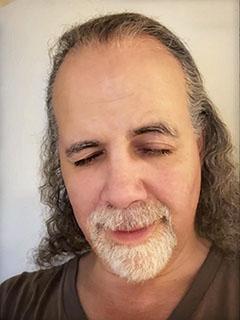Client Secures Peace of Mind Through DES VR Program

A steady job with financial stability can play a pivotal role in one's sense of security. Unfortunately, a stable work environment is not guaranteed, especially for workers with disabilities. The Arizona Department of Economic Security (DES) Vocational Rehabilitation (VR) program provides services designed to help Arizonans with disabilities obtain, maintain or regain employment. This includes individuals with low vision and blindness.
Former VR client, Herman Fermin, relocated to Arizona from his home state of New York after college. He was excited to begin his career as an IT professional in Flagstaff but had concerns about not being given an equal opportunity to work because of his disability. "I decided not to tell them [the hiring managers] I was blind," said Herman. "I went into my interview because I knew I was qualified."
He landed the job and was eventually provided with the assistive technology software he needed to perform his tasks effectively. However, the equipment belonged to the company he worked for, and this reliance left him feeling unstable as he would have to leave it behind if he ever lost his job.
According to Herman, people with disabilities often face disadvantages when looking for work. Not only do they have to compete to get hired like everyone else, but they also need to request accommodations to perform their duties. Herman believes that employers may have reservations about hiring people with disabilities, assuming that they can't do the job or will ask for too many accommodations.
Related: DES Proudly Offers Disability Employment Training for Employers
Despite being happy in his job, Herman wanted to secure a safety net for himself, so he turned to the VR program, where he was paired with VR counselor Evelyn Herrington.
"I lucked out having Evelyn," explained Herman. "She was a great counselor who was very supportive of what I needed." Evelyn connected him with VR contractors from InVision Technical, a company that specializes in providing assistive technology to clients who are blind and have visual impairments.
Herman was extremely satisfied with the training he received and said he felt, "exceptionally blessed to have had InVision Technical as my VR trainers - an experience that surpasses any description."
He explained that the owners, Sean and Deirdre Cummins, not only provided him with the assistive technology that he needs for work, but they also made him aware of the equipment that greatly improved his ability to work efficiently.
Program Manager, Jami Parente, says Arizona’s VR Counselors, who support individuals with low vision and blindness, "are passionate about helping their clients to access the services they need to become successfully employed." She says that to begin serving clients like Herman, the team focuses on the individual's specific needs. They assess the client’s "current visual acuity and skill level to determine the types of services needed to bridge the gap to independence, self-sufficiency, and employment."
Today, Herman enjoys his job as an IT support specialist, and he feels more secure knowing that he doesn’t need to rely on an employer for assistive technology to do his job. "VR helped me know that if I lost my job I am now on a stronger footing because I won’t have to ask for accommodations since I already have them."
To other job seekers with visual impairments and blindness, Herman says, "Don’t be discouraged. Being blind and finding a job is very difficult, but there are good people who will give you a chance and then it’s up to you. I don’t need the world to accommodate me, I need to be part of the world and things are getting better."
The DES VR program helps clients like Herman obtain employment and enhance workplace equality. To learn more, visit the Vocational Rehabilitation website.

